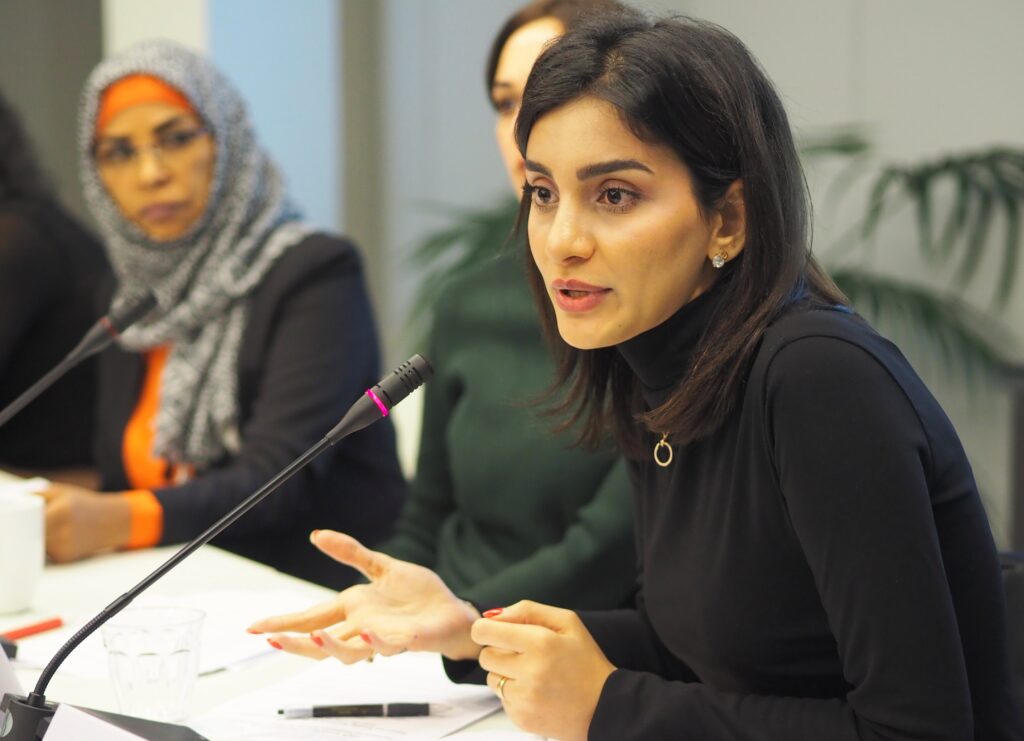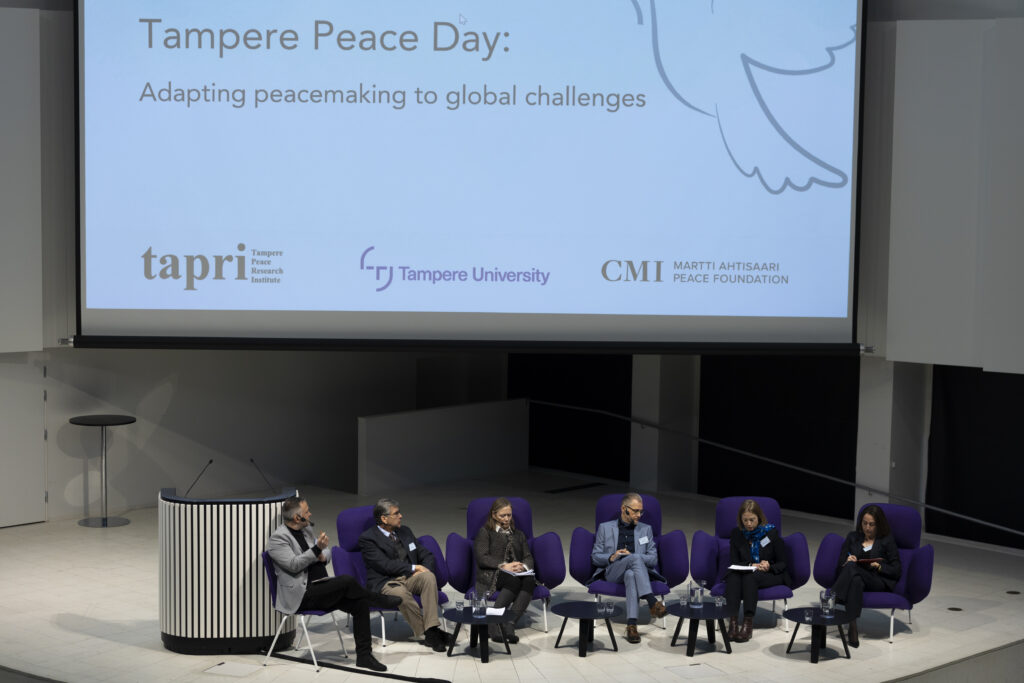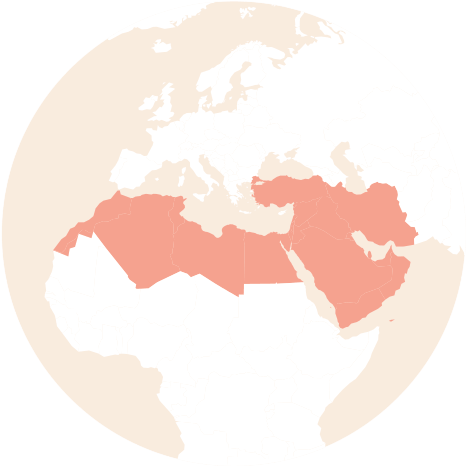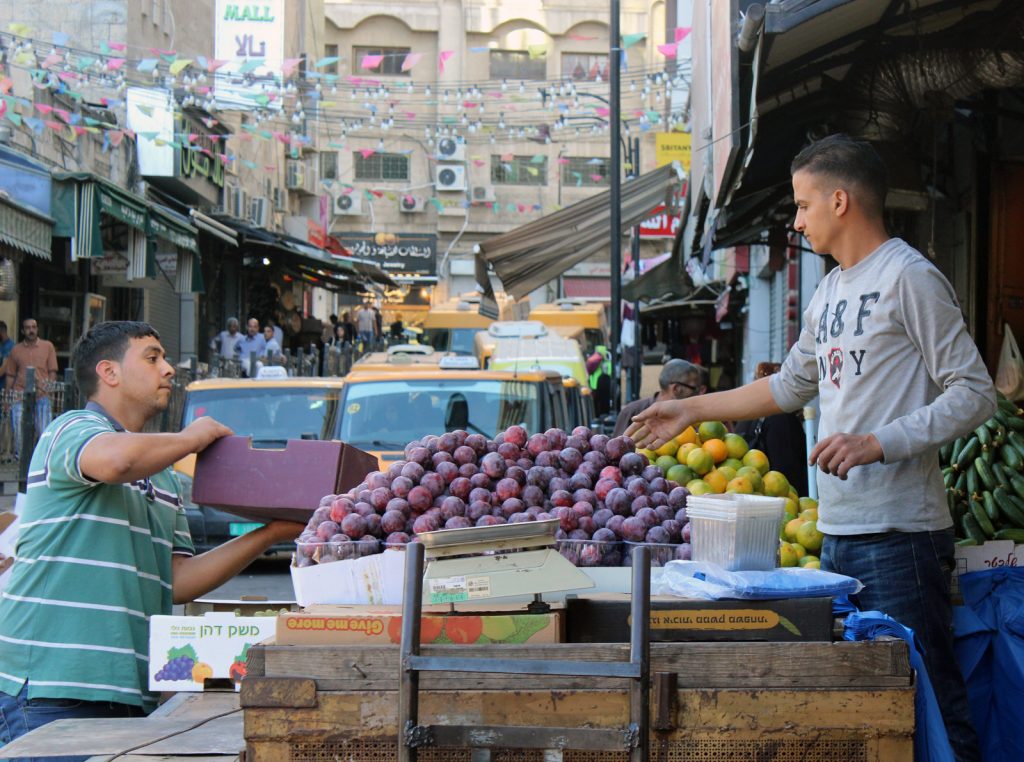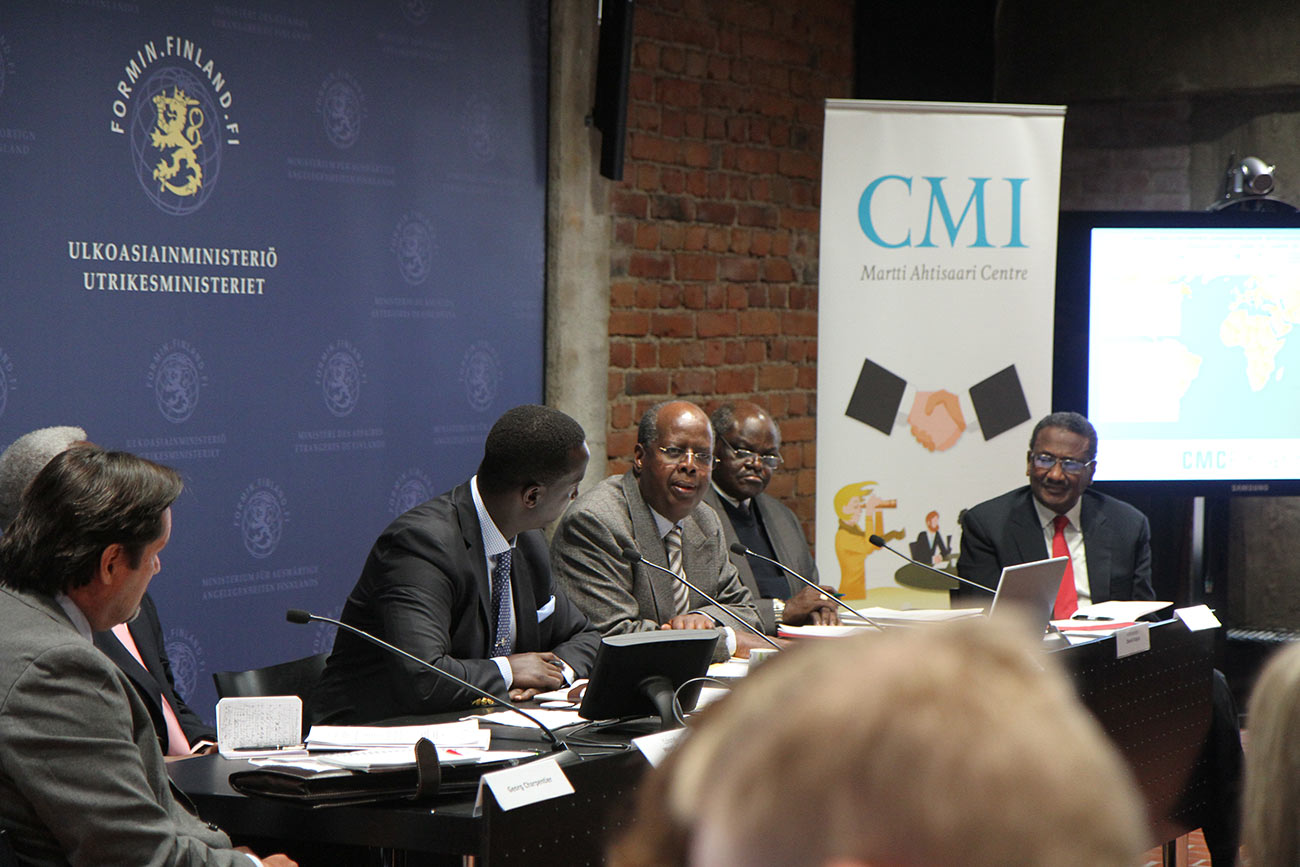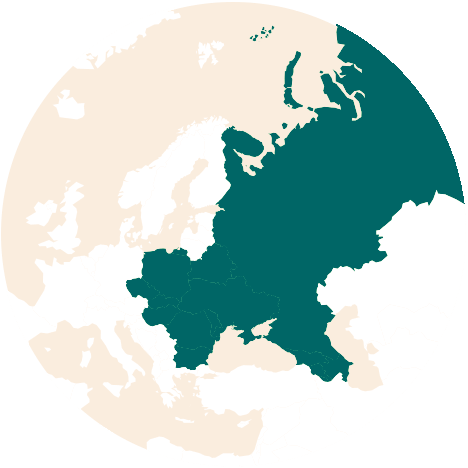
For over a decade, CMI has worked to contribute to a peaceful future in Eastern Europe, the South Caucasus and Central Asia. We support ongoing peace processes in the region by engaging with national, regional and international stakeholders, both state and non-state actors. Our efforts help enable dialogue and enhance good governance in societies facing challenging political transitions and, at times, violent conflicts.
Strengthening local, national and regional conflict resolution capacities are at the core of our support strategies. We also seek to open and maintain stable channels of communication and to build confidence across conflicts divides, principally in an informal manner, in the post-Soviet space and beyond. In doing so, CMI engages regularly with regional and international organizations including the European Union and the Organization for Security and Co-operation in Europe.
CMI’s experience in the region, commitment to long-term engagement, impartiality and Finnish identity uniquely enable us to pursue informal and complementary mediation efforts and to remain honest brokers in support of the most difficult peace processes in the Eurasia region.
Engagement in the crisis in and around Ukraine
CMI has supported Ukraine’s peaceful development since 2009, and since 2014 has facilitated high-level expert dialogue between political representatives and other influential public figures.
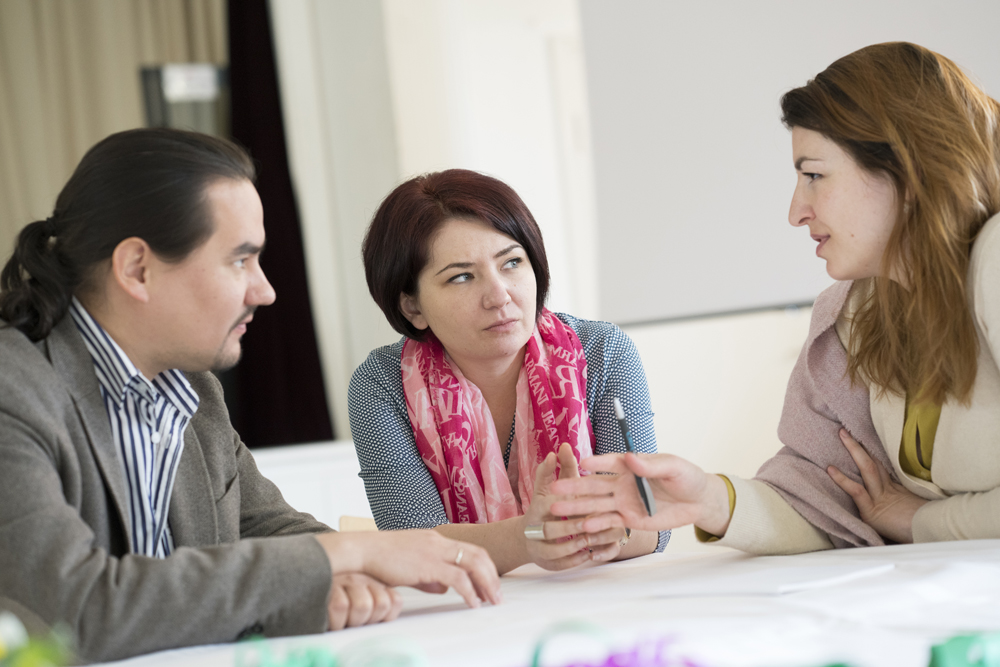
From left to right – Mr. Denis Matveev, Eurasia Programme Adviser, Ms. Roxana Cristescu, Head of the Eurasia Programme and Ms. Irma Pidtepa, Project Officer for the Eurasia Programme.
Ukraine remains in the process of transition from its Soviet institutional, economic, and socio-cultural legacy. Before the 2014 escalation of the current crisis phase, little attention was given to supporting and encouraging dialogue between and among elites and the wider society on building a shared vision of how Ukraine can, both as a state and as a nation, develop in the wake of its Soviet past.
Domestic and international dialogue
CMI has supported Ukraine’s expert community since 2009, with a focus on building a network of experts focused on conflict prevention and peacebuilding in the Black Sea Region. In early 2014, CMI began the process of supporting a high-level dialogue between representatives of Ukraine’s political and intellectual elite. In 2015, CMI began convening a regular Ukraine-Russia dialogue platform for influential experts and MPs which now also includes representatives from EU member states, the OSCE and the USA. Starting in October 2016, CMI increased its focus on capacity building for Ukrainian MPs, executives and experts, as well as deepening its cross-sectoral and inter-regional dialogue efforts inside Ukraine.
Support for national peacebuilding capacities
CMI supports Ukrainian actors in strengthening their capacities for effective engagement in the peace process. We work with many official and unofficial stakeholders from Ukrainian civil society and the expert community, and with individuals in the executive and legislative spheres. Within this component of our work we support public activities of the National Platform – Dialogue on Peace and Secure Reintegration. The objective is to ensure the ongoing functioning of a non-partisan, professional and inclusive public platform for supporting the achievement of sustainable peace in Ukraine. The Platform provides a regular, public and professionally moderated space to discuss effective policies for reintegration and ensuring national unity in Ukraine, as well as international experience of building confidence and sustainable peace. The National Platform has been in operation since February 2018, supported financially by Switzerland and Finland. Since 2019, it has been funded by the European Union.
Support for the official peace process
From 2015, CMI has worked with Ukrainian negotiators and experts engaged in the official Trilateral Contact Group in Minsk, providing expert support, international expertise and peer exchange opportunities from other peace negotiation processes and on focused topics related to the Donbas peace process.
CMI’s Ukraine work is funded through its Programme Partnership with the Ministry for Foreign Affairs of Finland, Federal Department of Foreign Affairs of Switzerland, Irish Government’s Development Cooperation Programme and by corporate donors from Finland’s private sector and by Finnish private philanthropists who comprise CMI’s premium donors group.
South Caucasus
CMI supports dialogue across conflict divides and the capacities of government officials in peace mediation efforts.
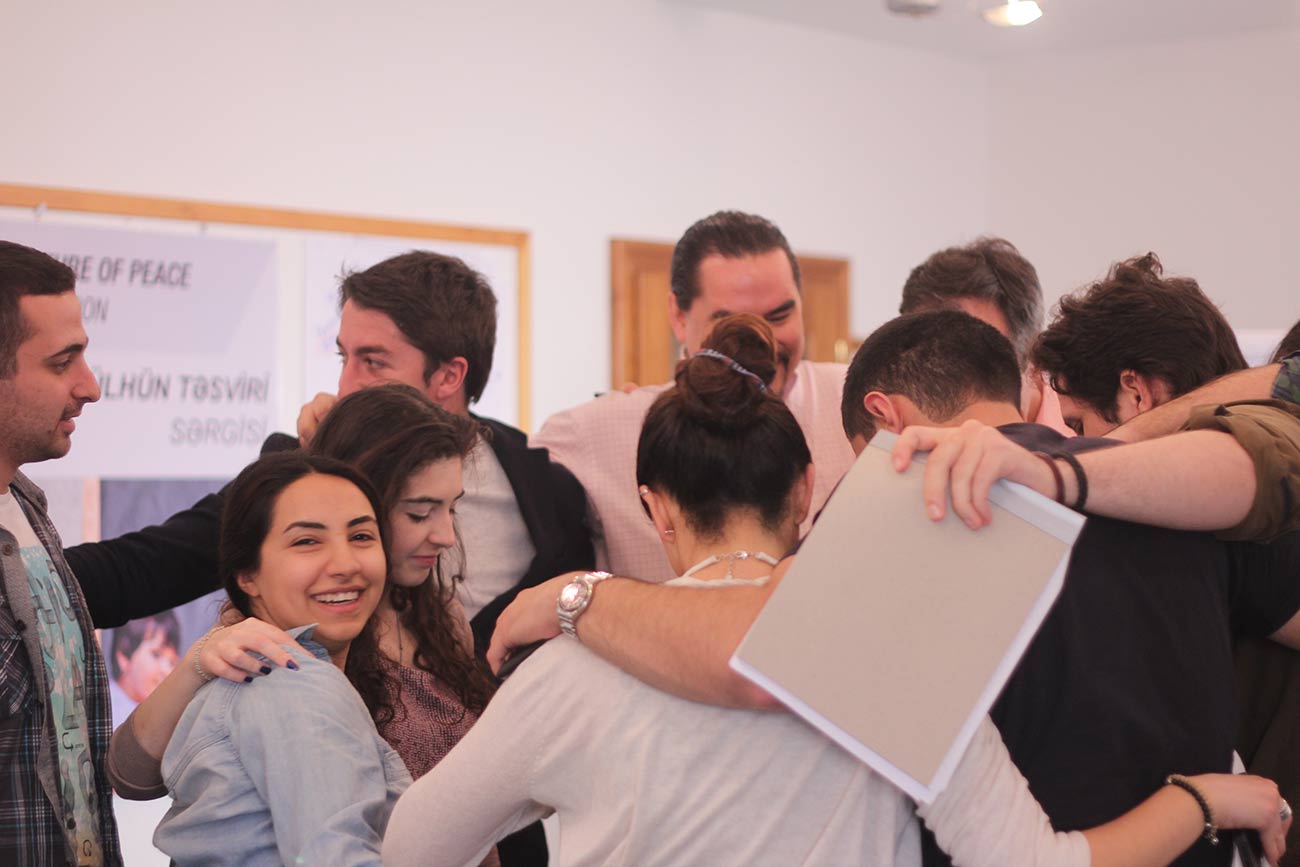
Since 2010, CMI has been working with actors from all sides of the conflict over Nagorno-Karabakh to establish channels of communication and increase confidence between groups of individuals.
A difficult process of transition that has continued since the collapse of the Soviet Union has left the South Caucasus deeply fragmented politically. With some of Eurasia’s major energy corridors and competing geopolitical interests, the region has major historical challenges and is also continually confronted with clashing geostrategic options, unstable economic development, and national and regional integration dilemmas. The three South Caucasus countries – Armenia, Azerbaijan and Georgia – have all chosen separate and at times opposing political paths, while trying to tackle severe domestic security and democratic development challenges.
Today, national and international actors are still searching for conflict settlement frameworks to address the unresolved statuses of Nagorno-Karabakh, Abkhazia, and South Ossetia. In light of the general instability now stretching from Ukraine to Syria, the illusory convenience of the status quo is no longer an option. The year of 2018 has seen multiple unprecedented developments throughout the region, both representing potential openings of windows of opportunity in terms of moving forward the official peace-processes, but also containing the seeds for a backlash/worsening of the general atmosphere around the non-recognized entities.
Therefore, the need is more urgent than ever for reinvigorated peace processes and tackling highly militarized conflicts that have polarized and alienated societies for decades. In a region that has seen human relations deteriorating to a point of almost no return, international mediation efforts and support for official peace negotiations must be complemented with long-term social transformations.
CMI has been active in the South Caucasus since 2006, facilitating and bringing discussions about conflict settlement to a broader constituency and enabling otherwise marginalized civil society actors to participate in dialogue and to contribute with suggestions relevant to the official talks.
Dialogue efforts at civil society level – Youth Platform
Since 2010, CMI has been working with actors from all sides of the Nagorno-Karabakh conflict to establish channels of communication and increase confidence between groups of individuals isolated or deeply affected by ongoing hostilities or by the lack of progress in official negotiations.
CMI has focused its efforts on the generation that grew up in isolation from each other after the 1990s war. This is a generation with very little positive experience of co-existence. More than twenty years of living alongside violence and personal exposure to military action have polarized these young people and profoundly challenged any shared vision they could have of how a potential settlement could be developed. The attitudes of the youth in these areas range from indifference to the conflict and its consequences, to aggression and polarizing nationalist stereotyping. In these circumstances, the chances of broad societal endorsement or support for official compromise grow increasingly slim.
Almost ten years of sustained engagement by CMI, with the support of the European Union (through the European Partnership for the peaceful settlement of the conflict over Nagorno-Karabakh, EPNK) have resulted in the creation of a cross-conflict platform of young professionals from all sides of the conflict divides. The platform’s members are currently mid-level peacebuilding actors working within their respective institutions (including NGOs, mass media, and executive and representative bodies), and strive to be able to come to terms with and positively transform their political and societal environment.
Supporting official actors
Since 2015, CMI has also focused on supporting key actors from official institutions engaged in conflict resolution in Armenia, Azerbaijan and Georgia. This support is designed to enhance peace mediation competences and to enrich the debate on these issues within each of the respective institutional systems.
Peace mediation is a very cost-effective means of conflict prevention and peacebuilding, and its value to local and regional peacemaking is widely recognized. Of vital importance to sustainable peace agreements is the ability of state actors and institutions to analyse complex conflict scenarios and explore inclusive pathways for settlements. For the official peace processes in the region to progress, the South Caucasus countries need a broad base of competent and experienced official actors who fully understand the complexities of mediation and peace processes. These actors must be able to provide analyses and recommendations within their institutions, and to the negotiators in the official talks.
In 2018, CMI together with partners in the region – NGO “European Integration” in Yerevan, Center of Excellence in EU Studies at the Azerbaijan Diplomatic Academy (ADA) in Baku, the International Centre for Geopolitical Studies (ICGS) in Tbilisi – and with the support of the European Union and the Finnish MFA, worked to help Armenian, Azerbaijani and Georgian officials to learn international best practices from peace processes in Europe and elsewhere. This learning model is now being piloted in other peace processes in the region.
- CMI has been active in the South Caucasus since 2006, promoting broad-based discussion on conflict settlement and enabling participation by otherwise marginalized civil society actors
- Since 2015, CMI also works to support key actors from official institutions involved in conflict resolution in Armenia, Azerbaijan and Georgia
- An essential element in sustainable peace agreements is the capacity of state actors and institutions to analyse complex conflict scenarios and explore inclusive solutions. CMI provides support in precisely these areas.
Supporting Institutionalised and Sustainable Dialogue on Gagauzia Autonomy
CMI works to facilitate the informal dialogue process between the Parliament of the Republic of Moldova and People’s Assembly of Gagauzia and provides good offices for the official political dialogue platform to improve institutional mechanisms of centre-autonomy relations.
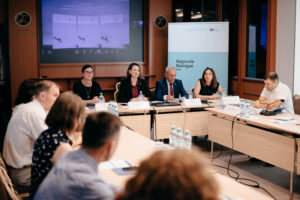
CMI’s Project Manager Natalia Djandjgava (middle) and Country Manager Steve Young (right) at an expert round table and presentation of the report elaborated within the Gagauzia project.
The Gagauz autonomy was established in the south of Moldova in order to safeguard the rights of the Gagauz minority, following a period of unrest in the early 1990s. In 1994, Moldova passed a law on the Special Legal Status of Gagauz Yeri which outlined the structure of the autonomy, including a legislature (the People’s Assembly, consisting of 35 members) and an executive branch, headed by the Governor (the Bashkan). The establishment of the autonomy is seen as a successful conflict resolution model. However, implementation of the 1994 Law has been inconsistent, resulting in frequent disputes and a growing source of tension between the central Government and the autonomy.
To address these challenges, in 2015, with funding from Sweden, CMI convened an informal dialogue group made up of representatives from the Moldovan Parliament and the People’s Assembly of Gagauzia for sustained joint dialogue to build confidence between both sets of legislators and improve the functioning of the autonomy. Following this initiative, and the creation of the official Parliamentary Working Group on Gagauzia (PWG) CMI was mandated to support the work of the official PWG and decision-making dialogue platform.
The project contributes to the institutionalization and sustainability of the dialogue between the centre and the autonomy through strengthening institutions, capacities and ownership around the PWG. CMI facilitates access to all the necessary knowledge and tools, thus enabling the stakeholders to come together to find joint solutions to common issues. CMI uses its international expertise in informal mediation to facilitate the informal dialogue process providing the necessary technical support, contributes to the capacity building of both national and autonomy stakeholders as well as cooperating with academia and the expert community to ensure continuity of the dialogue process.
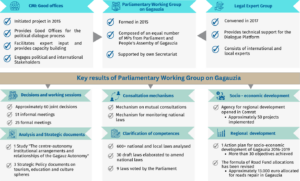
- The Gagauz-Yeri autonomous region was established in southern Moldova in the early 1990s to safeguard the rights of the Gagauz minority.
- In late 2015 the Moldovan Parliament launched an official initiative to create the first permanent parliamentary working group to improve the functionality of Gagauzia’s autonomy within Moldova’s constitutional framework.
- CMI provides good offices to the parliamentary platform and facilitates informal dialogue offering expert support and capacity building, and contributing to the institutionalization and sustainability of the dialogue between the centre and the autonomy.
You can find the website of the project here. The project report 2015 – 2018 can be found here and the project newsletter here. The expert report on centre-autonomy arrangements can be found here.
Transdniestrian settlement process
Since 2011 CMI has contributed to efforts towards a peaceful and equitable settlement to the Transdniestrian conflict.
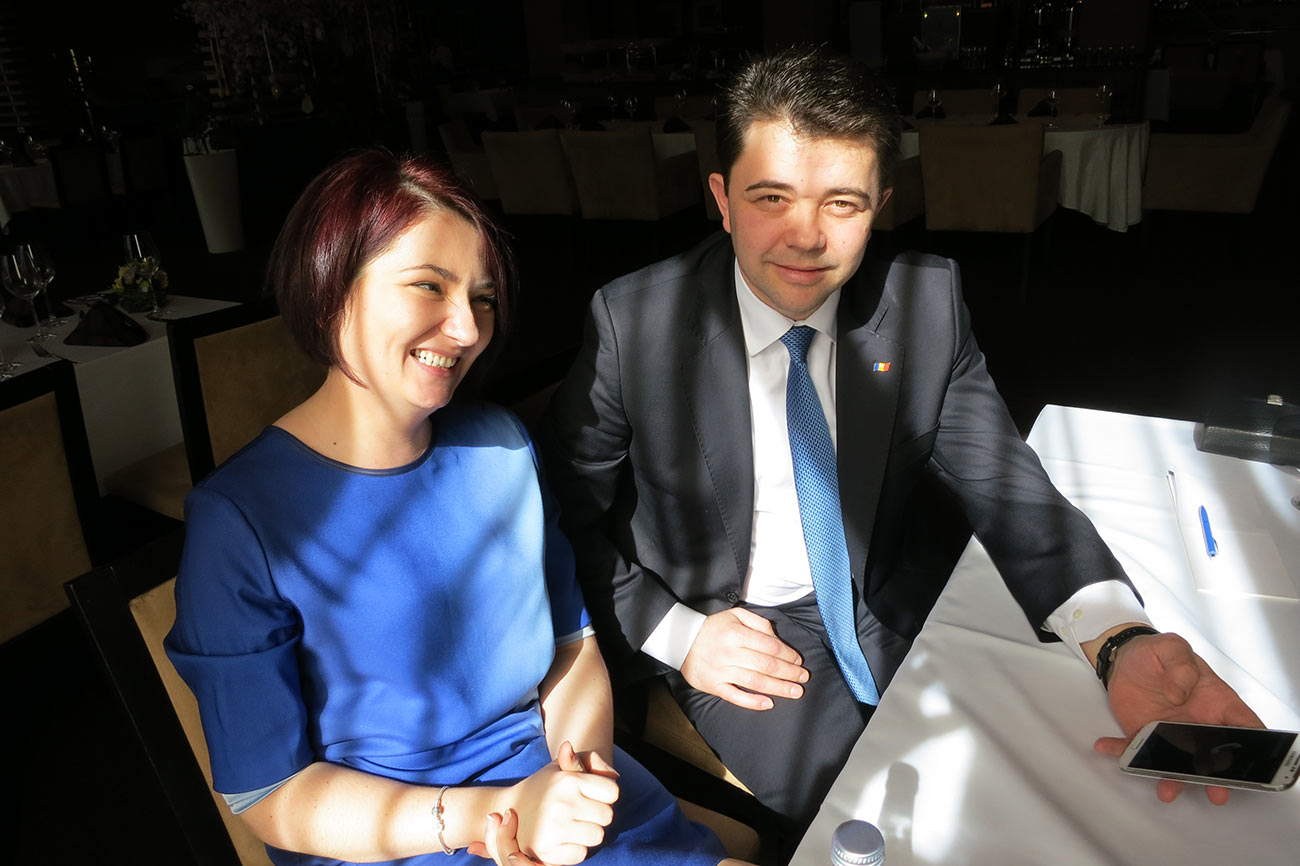
Roxana Cristescu, CMI’s head of Eurasia, and Moldova’s former deputy prime minister Victor Osipov continue to seek ways to solve the conflict.
The Transdniestrian conflict zone is less than 100 kilometres from the EU’s Eastern borders. Since the war in 1992, the Republic of Moldova and Transdniestria have been engaged on and off in negotiations towards a political solution for the inhabitants on both sides of the River Dniestr/Nistru. The tensions have had a serious impact on the population of both sides and have hampered the whole region’s socio-economic development. Despite years of international mediation efforts, the final settlement of the conflict remains unresolved.
CMI’s work in the region includes support to the peace process on multiple levels, focusing on building confidence between the sides, engaging with the sides on key issues where international and local expert support can be of most help and support to the formal settlement process.
Since 2011, CMI has worked to support the conflict settlement process by convening and supporting ongoing informal dialogue between high-level independent experts, former diplomats with expertise in the conflict, political analysts, former negotiators in the official settlement processand current advisers to the political leadership in Chisinau and Tiraspol. CMI’s dialogue platform members have provided briefings to international actors, directly involved in and influencing the settlement process in Vienna, Brussels, Moscow, Washington, Kyiv, and other key capitals.
Since 2017, CMI has facilitated a high-level Track 1 dialogue between the sides on issues of relevance to the confidence building measures and to complement the settlement process. Dialogue platform members haveengaged in regular exchanges on the major short-term and long-term political trends and issues that influence the settlement process.
In order to increase connectivity between local, national and international actors, CMI also facilitates regular exchanges between its dialogue platforms and relevant institutions. Over the years, CMI provided tailored support to the international actors bringing dialogue platform participants and locally generated analysis and recommendations to international actors with special focus on the OSCE.
CMI engages with Chisinau and Tiraspol on a regular basis, focusing on issues and actors that are most central to the settlement process. This has led to provision of tailored support to the political negotiators and to Track 1 working groups. CMI also uses these efforts, through facilitating events that create space for informal and open dialogue on sensitive issues, to contribute to the efforts of the negotiators, mediators and observers to find solutions based on compromise. These events make use of relevant international experience, peer exchange events, and lead to the development of analytical materials.
- CMI’s work in the Transdniestrian region includes a wide range of activities in support of the peace process
- CMI facilitates an ongoing dialogue process involving key influencers from both sides of the conflict
- Most recently, CMI has also focused on key issues related to the settlement process and providing tailored support to the OSCE chairmanships.
Western Balkans
The Western Balkans region comprises of six countries: Republic of Albania, Bosnia and Herzegovina, Montenegro, Republic of Kosovo, Republic of North Macedonia, and Republic of Serbia. These states, with the exception of Albania, are successor states of the former Yugoslavia.
Due to the traumatic history and the lack of reconciliation, there are several unresolved issues hindering regional development and cooperation in the Western Balkans. Fragile rule of law, vulnerable economies, and lingering regional disputes are some of the challenges impacting Balkan countries’ development and EU integration. For stability and prosperity of the region, the underlying issues of the region have to be resolved.
For instance, the lack of normalization of relations between Kosovo and Serbia is one of the areas that has wider implications for the stability of the region. Since 2011, Serbia and Kosovo have participated in a series of EU-facilitated talks as part of a political process known as the Belgrade–Pristina dialogue.
CMI supports dialogue efforts in the region
CMI’s founder President Martti Ahtisaari has a strong legacy in the Western Balkans due to his key role in the UN-led status process of Kosovo. After following the Western Balkans closely for many years, CMI became active in the region in 2021 to support the ongoing dialogue process.
In 2023, CMI will continue its activities in the Western Balkans region as part of its new portfolio. This portfolio contains a combination of request-based activities and engagement in the relevant areas of need, including activities that support the process of normalization of relations between Belgrade and Pristina. The project activities will include support to official dialogue processes and engagement with non-official actors in dialogue and conflict prevention.

